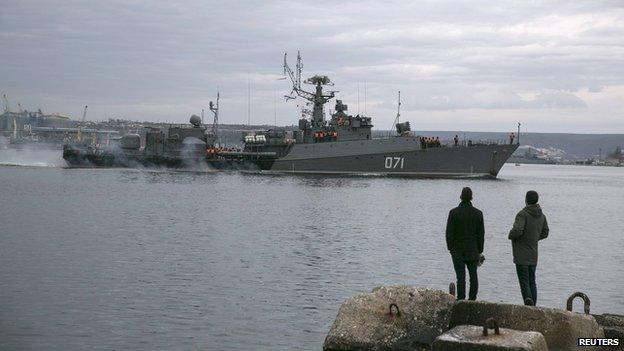Ukraine: How will the West respond?
- Published

At least half-a-dozen Russian ships arrived in Sevastopol on Sunday
I had been absent from Kiev for less than three days. The lightness, the hint of a Kiev spring, the sudden smiles of a week before were already waning. Now the mood is much darker; there is defiance and rage against Moscow and Russia's President Vladimir Putin.
Just seven days earlier some had dared to speak of "victory"; now the talk is of war. Speaking of Russia's actions in Crimea, the new Prime Minister Arseniy Yatsenyuk said "this is the red alert, this is not a threat, this is actually a declaration of war".
All weekend the drumbeat of alarm has grown stronger; the biggest confrontation between Russia and the West since the Cold War. The secretary general of Nato says "peace and security in Europe" is threatened.
New reality
The biggest fear is of an accidental war. A miscalculation at a road block or outside a military post could rapidly escalate into conflict. It will be much longer and much bloodier than the five-day war I covered in Georgia in 2008.
Soldiers, believed to be Russian, have taken up positions outside Ukrainian military barracks across Crimea
This time President Putin has moved quickly in Crimea. There is already a new reality on the ground. Pro-Moscow demonstrators in other places are making the same pitch, that they would like Russia's help. In this moment Putin will be calculating the West's response and its determination to act. He is not alone. So are the leaders of the protesters, many of whom now sit in government. They are urging states "who guaranteed Ukraine's integrity to fulfil their obligations" - in particular they are looking to the EU.
To a remarkable degree EU officials championed their cause. They stood shoulder to shoulder with the protesters. They chose to ignore the fact that - tolerate or loathe him - Viktor Yanukovych was an elected leader. They glossed over the significant role played by nationalist groups in the defence of Independence Square. And they were clear with their intentions - "the future of Ukraine belongs with the EU," said EU President Herman Van Rompuy. It infuriated Moscow who saw it as a power grab in its own zone of influence.
'To the hilt'
Both Moscow and Kiev are now watching the EU and the West. US Secretary of State John Kerry has promised "very serious repercussions". Not taking part in G8 planning meetings ahead of a key summit in Sochi does not really cut it. And Kerry knows it. He says: "They (the West) are prepared to isolate Russia economically". He speaks of visa bans and asset freezes.
US Secretary of State John Kerry said the Russian move was a 'brazen act of aggression'.
The first test of the West's intention will be Germany. Will Berlin with its special economic relationship with Moscow and its energy dependency be prepared to make a sacrifice to hold Putin's hand? Will the UK - with London the favourite capital for Russia's wealthy - back asset freezes? Will the EU be prepared to take a hit economically on behalf of its new friend?
John Kerry said that other G8 countries would "go to the hilt to isolate Russia". The next 48 hours will reveal their intent. Economic pressure is the only card they have.
On Monday Ukraine begins a call-up of its reservists.